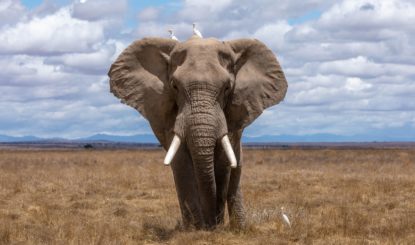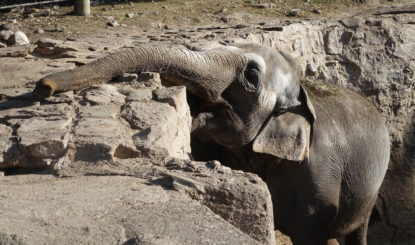Media Release: Zurich Zoo loses its 6th young elephant in 3 years – a reappraisal is necessary
On Monday, January 16, 2023, the Zoo Zürich published a press release announcing that the 17-year-old elephant Farha had given birth to a baby elephant on Sunday night. However, this one, qualified as “too weak to live” by the Zoo, died a few moments after its birth. This is the sixth young elephant that the Zoo has lost since 2020: the Franz Weber Foundation (FFW) is calling for a thorough review of the keeping of live elephants – in Zurich as elsewhere.
The Zurich Zoo prides itself on being a world leader in the keeping of elephants, and an ideal place for their reproduction. To reinforce this impression of expertise, the Zoo states in its press release that Farha and her mother (the grandmother, Ceyla-Himali), have behaved in an “exemplary” manner, making it appear that the conditions at the zoo would allow the elephants to display their natural behaviors. This is not the case, and the conditions of detention are far from adequate for elephants. The proof: since 2020, the small male elephant who died on Sunday night is the sixth elephant to die at the Zurich Zoo due to health problems (the zoo currently holds five).
In April and August 2020 two baby elephants had died – both trampled by the other elephants of the zoo, which had then also tried to make believe in a natural behavior. The FFW issued a media release, based on an article by elephant biologist Dr. Keith Lindsay, stating that the deaths where unnatural and induced by the zoo’s conditions. Last year, the zoo lost three young elephants due to the herpes virus EEHV. In a media release, the FFW explained why these deaths are also not natural as claimed by the zoo, but point to mismanagement in zoos.
Even today, the death of the baby elephant is most likely directly attributable to the conditions of captivity. Elephants in zoos are confined to small spaces, with no real opportunity for adequate physical exercise, or to forage for (or choose) food. This leads to many cases of obesity. In fact, Zurich Zoo has a chronic problem with the physical condition of its elephants; in particular, Farha is obese. This condition is linked to numerous health problems in elephants, including reproductive problems, such as the weight of the baby elephant at birth and difficulties in giving birth, as reported by the Zoo1.
For Farha, this is the third baby that does not survive. Normally, the interval between pregnancies in an elephant is around 5 years – while Farha’s last pregnancy was only about a year before she got pregnant with the bull that she birthed last weekend. “Because elephants are highly social and intelligent animals, they perceive these deaths as a real trauma – a huge sadness for all the surviving animals,” says Dr. Lindsay, also a member of the IUCN African Elephant Specialist Group2. “Zoos continue to insist on breeding their elephants when they don’t have the natural conditions to do so, and without regard for the physical and psychological health of these animals. This is simply cruel.
Zurich Zoo believes that it is contributing to the protection of elephants through its breeding program. In reality, the number of wild elephants and of elephants in zoos are both decreasing. The mortality rate far exceeds the birth rate and zoos will have none left within 50 years3; they must continue to take new elephants from the wild, putting more pressure on wild populations. “The efforts – and the colossal financial means – deployed by zoos to reproduce elephants in captivity would be much more useful for the protection of the species in its natural habitat”, according to Vera Weber, president of the FFW, “keeping these animals in captivity, and trying to make them procreate, does not contribute at all to the conservation of the species, and only perpetuates an immense suffering”. The Zurich Zoo, like other zoos, must fundamentally question their keeping of elephants.


